15 Should Homework Be Banned Pros and Cons
Homework was a staple of the public and private schooling experience for many of us growing up. There were long nights spent on book reports, science projects, and all of those repetitive math sheets. In many ways, it felt like an inevitable part of the educational experience. Unless you could power through all of your assignments during your free time in class, then there was going to be time spent at home working on specific subjects.
More schools are looking at the idea of banning homework from the modern educational experience. Instead of sending work home with students each night, they are finding alternative ways to ensure that each student can understand the curriculum without involving the uncertainty of parental involvement.
Although banning homework might seem like an unorthodox process, there are legitimate advantages to consider with this effort. There are some disadvantages which some families may encounter as well.
These are the updated lists of the pros and cons of banning homework to review.

List of the Pros of Banning Homework
1. Giving homework to students does not always improve their academic outcomes. The reality of homework for the modern student is that we do not know if it is helpful to have extra work assigned to them outside of the classroom. Every study that has looked at the subject has had design flaws which causes the data collected to be questionable at best. Although there is some information to suggest that students in seventh grade and higher can benefit from limited homework, banning it for students younger than that seems to be beneficial for their learning experience.
2. Banning homework can reduce burnout issues with students. Teachers are seeing homework stress occur in the classroom more frequently today than ever before. Almost half of all high school teachers in North America have seen this issue with their students at some point during the year. About 25% of grade school teachers say that they have seen the same thing.
When students are dealing with the impact of homework on their lives, it can have a tremendously adverse impact. One of the most cited reasons for students dropping out of school is that they cannot complete their homework on time.
3. Banning homework would increase the amount of family time available to students. Homework creates a significant disruption to family relationships. Over half of all parents in North America say that they have had a significant argument with their children over homework in the past month. 1/3 of families say that homework is their primary source of struggle in the home. Not only does it reduce the amount of time that everyone has to spend together, it reduces the chances that parents have to teach their own skills and belief systems to their kids.
4. It reduces the negative impact of homework on the health of a student. Many students suffer academically when they cannot finish a homework assignment on time. Although assumptions are often made about the time management skills of the individual when this outcome occurs, the reasons why it happens is usually more complex. It may be too difficult, too boring, or there may not be enough time in the day to complete the work.
When students experience failure in this area, it can lead to severe mental health issues. Some perceive themselves as a scholarly failure, which translates to an inability to live life successfully. It can disrupt a desire to learn. There is even an increased risk of suicide for some youth because of this issue. Banning it would reduce these risks immediately.
5. Eliminating homework would allow for an established sleep cycle. The average high school student requires between 8-10 hours of sleep to function at their best the next day. Grade-school students may require an extra hour or two beyond that figure. When teachers assign homework, then it increases the risk for each individual that they will not receive the amount that they require each night.
When children do not get enough sleep, a significant rest deficit occurs which can impact their ability to pay attention in school. It can cause unintended weight gain. There may even be issues with emotional control. Banning homework would help to reduce these risks as well.
6. It increases the amount of socialization time that students receive. People who are only spending time in school and then going home to do more work are at a higher risk of experiencing loneliness and isolation. When these emotions are present, then a student is more likely to feel “down and out” mentally and physically. They lack meaningful connections with other people. These feelings are the health equivalent of smoking 15 cigarettes per day. If students are spending time on homework, then they are not spending time connecting with their family and friends.
7. It reduces the repetition that students face in the modern learning process. Most of the tasks that homework requires of students is repetitive and uninteresting. Kids love to resolve challenges on tasks that they are passionate about at that moment in their lives. Forcing them to complete the same problems repetitively as a way to “learn” core concepts can create issues with knowledge retention later in life. When you add in the fact that most lessons sent for homework must be done by themselves, banning homework will reduce the repetition that students face, allowing for a better overall outcome.
8. Home environments can be chaotic. Although some students can do homework in a quiet room without distractions, that is not the case for most kids. There are numerous events that happen at home which can pull a child’s attention away from the work that their teacher wants them to do. It isn’t just the Internet, video games, and television which are problematic either. Household chores, family issues, employment, and athletic requirements can make it a challenge to get the assigned work finished on time.
List of the Cons of Banning Homework
1. Homework allows parents to be involved with the educational process. Parents need to know what their children are learning in school. Even if they ask their children about what they are learning, the answers tend to be in generalities instead of specifics. By sending home work from the classroom, it allows parents to see and experience the work that their kids are doing when they are in school during the day. Then moms and dads can get involved with the learning process to reinforce the core concepts that were discovered by their children each day.
2. It can help parents and teachers identify learning disabilities. Many children develop a self-defense mechanism which allows them to appear like any other kid that is in their classroom. This process allows them to hide learning disabilities which may be hindering their educational progress. The presence of homework makes it possible for parents and teachers to identify this issue because kids can’t hide their struggles when they must work 1-on-1 with their parents on specific subjects. Banning homework would eliminate 50% of the opportunities to identify potential issues immediately.
3. Homework allows teachers to observe how their students understand the material. Teachers often use homework as a way to gauge how well a student is understanding the materials they are learning. Although some might point out that assignments and exams in the classroom can do the same thing, testing often requires preparation at home. It creates more anxiety and stress sometimes then even homework does. That is why banning it can be problematic for some students. Some students experience more pressure than they would during this assessment process when quizzes and tests are the only measurement of their success.
4. It teaches students how to manage their time wisely. As people grow older, they realize that time is a finite commodity. We must manage it wisely to maximize our productivity. Homework assignments are a way to encourage the development of this skill at an early age. The trick is to keep the amount of time required for the work down to a manageable level. As a general rule, students should spend about 10 minutes each school day doing homework, organizing their schedule around this need. If there are scheduling conflicts, then this process offers families a chance to create priorities.
5. Homework encourages students to be accountable for their role. Teachers are present in the classroom to offer access to information and skill-building opportunities that can improve the quality of life for each student. Administrators work to find a curriculum that will benefit the most people in an efficient way. Parents work hard to ensure their kids make it to school on time, follow healthy routines, and communicate with their school district to ensure the most effective learning opportunities possible. None of that matters if the student is not invested in the work in the first place. Homework assignments not only teach children how to work independently, but they also show them how to take responsibility for their part of the overall educational process.
6. It helps to teach important life lessons. Homework is an essential tool in the development of life lessons, such as communicating with others or comprehending something they have just read. It teaches kids how to think, solve problems, and even build an understanding for the issues that occur in our society right now. Many of the issues that lead to the idea to ban homework occur because someone in the life of a student communicated to them that this work was a waste of time. There are times in life when people need to do things that they don’t like or want to do. Homework helps a student begin to find the coping skills needed to be successful in that situation.
7. Homework allows for further research into class materials. Most classrooms offer less than 1 hour of instruction per subject during the day. For many students, that is not enough time to obtain a firm grasp on the materials being taught. Having homework assignments allows a student to perform more research, using their at-home tools to take a deeper look into the materials that would otherwise be impossible if homework was banned. That process can lead to a more significant understanding of the concepts involved, reducing anxiety levels because they have a complete grasp on the materials.
The pros and cons of banning homework is a decision that ultimately lies with each school district. Parents always have the option to pursue homeschooling or online learning if they disagree with the decisions that are made in this area. Whether you’re for more homework or want to see less of it, we can all agree on the fact that the absence of any reliable data about its usefulness makes it a challenge to know for certain which option is the best one to choose in this debate.
- Share full article
Advertisement
Supported by
Student Opinion
Should We Get Rid of Homework?
Some educators are pushing to get rid of homework. Would that be a good thing?

By Jeremy Engle and Michael Gonchar
Do you like doing homework? Do you think it has benefited you educationally?
Has homework ever helped you practice a difficult skill — in math, for example — until you mastered it? Has it helped you learn new concepts in history or science? Has it helped to teach you life skills, such as independence and responsibility? Or, have you had a more negative experience with homework? Does it stress you out, numb your brain from busywork or actually make you fall behind in your classes?
Should we get rid of homework?
In “ The Movement to End Homework Is Wrong, ” published in July, the Times Opinion writer Jay Caspian Kang argues that homework may be imperfect, but it still serves an important purpose in school. The essay begins:
Do students really need to do their homework? As a parent and a former teacher, I have been pondering this question for quite a long time. The teacher side of me can acknowledge that there were assignments I gave out to my students that probably had little to no academic value. But I also imagine that some of my students never would have done their basic reading if they hadn’t been trained to complete expected assignments, which would have made the task of teaching an English class nearly impossible. As a parent, I would rather my daughter not get stuck doing the sort of pointless homework I would occasionally assign, but I also think there’s a lot of value in saying, “Hey, a lot of work you’re going to end up doing in your life is pointless, so why not just get used to it?” I certainly am not the only person wondering about the value of homework. Recently, the sociologist Jessica McCrory Calarco and the mathematics education scholars Ilana Horn and Grace Chen published a paper, “ You Need to Be More Responsible: The Myth of Meritocracy and Teachers’ Accounts of Homework Inequalities .” They argued that while there’s some evidence that homework might help students learn, it also exacerbates inequalities and reinforces what they call the “meritocratic” narrative that says kids who do well in school do so because of “individual competence, effort and responsibility.” The authors believe this meritocratic narrative is a myth and that homework — math homework in particular — further entrenches the myth in the minds of teachers and their students. Calarco, Horn and Chen write, “Research has highlighted inequalities in students’ homework production and linked those inequalities to differences in students’ home lives and in the support students’ families can provide.”
Mr. Kang argues:
But there’s a defense of homework that doesn’t really have much to do with class mobility, equality or any sense of reinforcing the notion of meritocracy. It’s one that became quite clear to me when I was a teacher: Kids need to learn how to practice things. Homework, in many cases, is the only ritualized thing they have to do every day. Even if we could perfectly equalize opportunity in school and empower all students not to be encumbered by the weight of their socioeconomic status or ethnicity, I’m not sure what good it would do if the kids didn’t know how to do something relentlessly, over and over again, until they perfected it. Most teachers know that type of progress is very difficult to achieve inside the classroom, regardless of a student’s background, which is why, I imagine, Calarco, Horn and Chen found that most teachers weren’t thinking in a structural inequalities frame. Holistic ideas of education, in which learning is emphasized and students can explore concepts and ideas, are largely for the types of kids who don’t need to worry about class mobility. A defense of rote practice through homework might seem revanchist at this moment, but if we truly believe that schools should teach children lessons that fall outside the meritocracy, I can’t think of one that matters more than the simple satisfaction of mastering something that you were once bad at. That takes homework and the acknowledgment that sometimes a student can get a question wrong and, with proper instruction, eventually get it right.
Students, read the entire article, then tell us:
Should we get rid of homework? Why, or why not?
Is homework an outdated, ineffective or counterproductive tool for learning? Do you agree with the authors of the paper that homework is harmful and worsens inequalities that exist between students’ home circumstances?
Or do you agree with Mr. Kang that homework still has real educational value?
When you get home after school, how much homework will you do? Do you think the amount is appropriate, too much or too little? Is homework, including the projects and writing assignments you do at home, an important part of your learning experience? Or, in your opinion, is it not a good use of time? Explain.
In these letters to the editor , one reader makes a distinction between elementary school and high school:
Homework’s value is unclear for younger students. But by high school and college, homework is absolutely essential for any student who wishes to excel. There simply isn’t time to digest Dostoyevsky if you only ever read him in class.
What do you think? How much does grade level matter when discussing the value of homework?
Is there a way to make homework more effective?
If you were a teacher, would you assign homework? What kind of assignments would you give and why?
Want more writing prompts? You can find all of our questions in our Student Opinion column . Teachers, check out this guide to learn how you can incorporate them into your classroom.
Students 13 and older in the United States and Britain, and 16 and older elsewhere, are invited to comment. All comments are moderated by the Learning Network staff, but please keep in mind that once your comment is accepted, it will be made public.
Jeremy Engle joined The Learning Network as a staff editor in 2018 after spending more than 20 years as a classroom humanities and documentary-making teacher, professional developer and curriculum designer working with students and teachers across the country. More about Jeremy Engle
- Grades 6-12
- School Leaders
Have You Seen Our List of Favorite Graphic Novels?
Should Homework Be Banned? Here’s What Real Educators Think
Plus, what research on the subject really tells us.
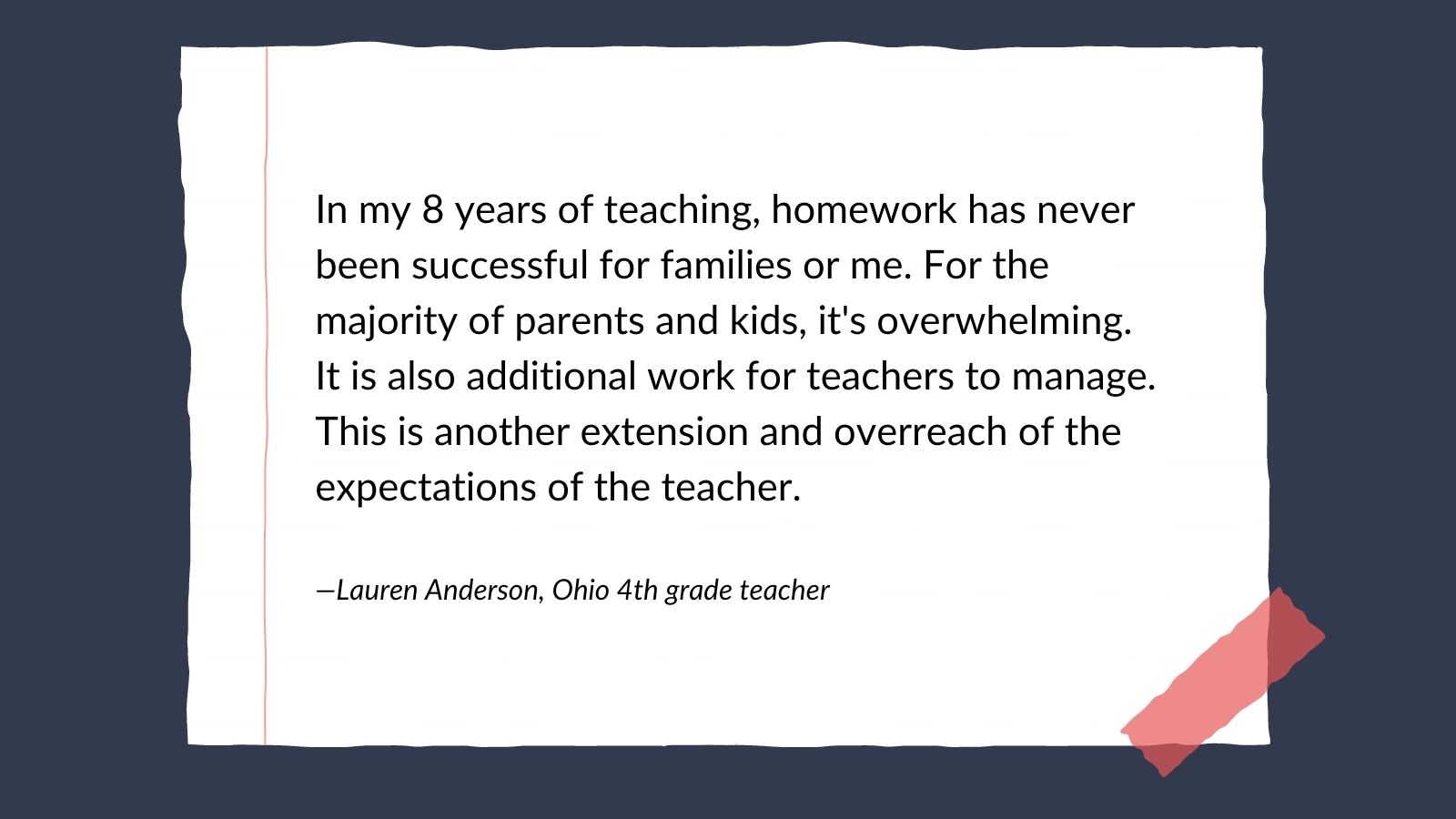
Every kid dreams of it: “Homework banned forevermore!” For as long as anyone can remember, homework has just been one of those things kids have to do because it’s good for them, like eating their vegetables. But is it really as important to do hours of homework every night as it is to eat broccoli and carrots? New research suggests homework might not have a whole lot of value. This leads to a big question: Should we ban homework?
“I think parents already have enough stress just in providing for their families!” says one Arizona 1st grade teacher. “I can imagine one more chore of having to sit down and do homework with their child would add that much more stress. Kids don’t like doing homework, so it frustrates them, which in turn frustrates parents. They spend time fighting about homework that they could be spending quality time over a board game or family meal!”
We wanted to know more, as every educator should. So, we combed through recent research to see what experts say, and explored the news to see what schools in the United States and abroad have tried. Plus, we asked 40+ active K-12 educators to share their thoughts. Here’s what we found out.
Does homework actually work?
This is one of the biggest questions people have around homework bans. Is it worth the time students are spending on it? How many kids actually do it consistently? How involved do parents need to be? In short: Does homework have value?
What the Research Says
Educators first started asking serious questions about homework more than 20 years ago, when an article that evaluated decades of research on homework suggested that it might not be as effective as we thought, at least in the lower grades . But other studies on homework indicate that students who do homework as assigned have higher academic outcomes overall, especially in grades 7 through 12.
What Real Educators Say
Most of the teachers that responded to our survey felt homework (especially for upper grades) does have at least some value. Many, though, were less concerned with academic benefits and more with developing general life skills like time management and responsibility.
- “For older students, reasonable homework that is preparation for class the next day helps students learn how to manage their time, meet deadlines, and take responsibility for their learning. I am a fan of flipped learning—students watch the lesson for homework and then use class time to ask questions, work together, work with their teacher, and do the work.” —Julie Mason, MS/HS English teacher
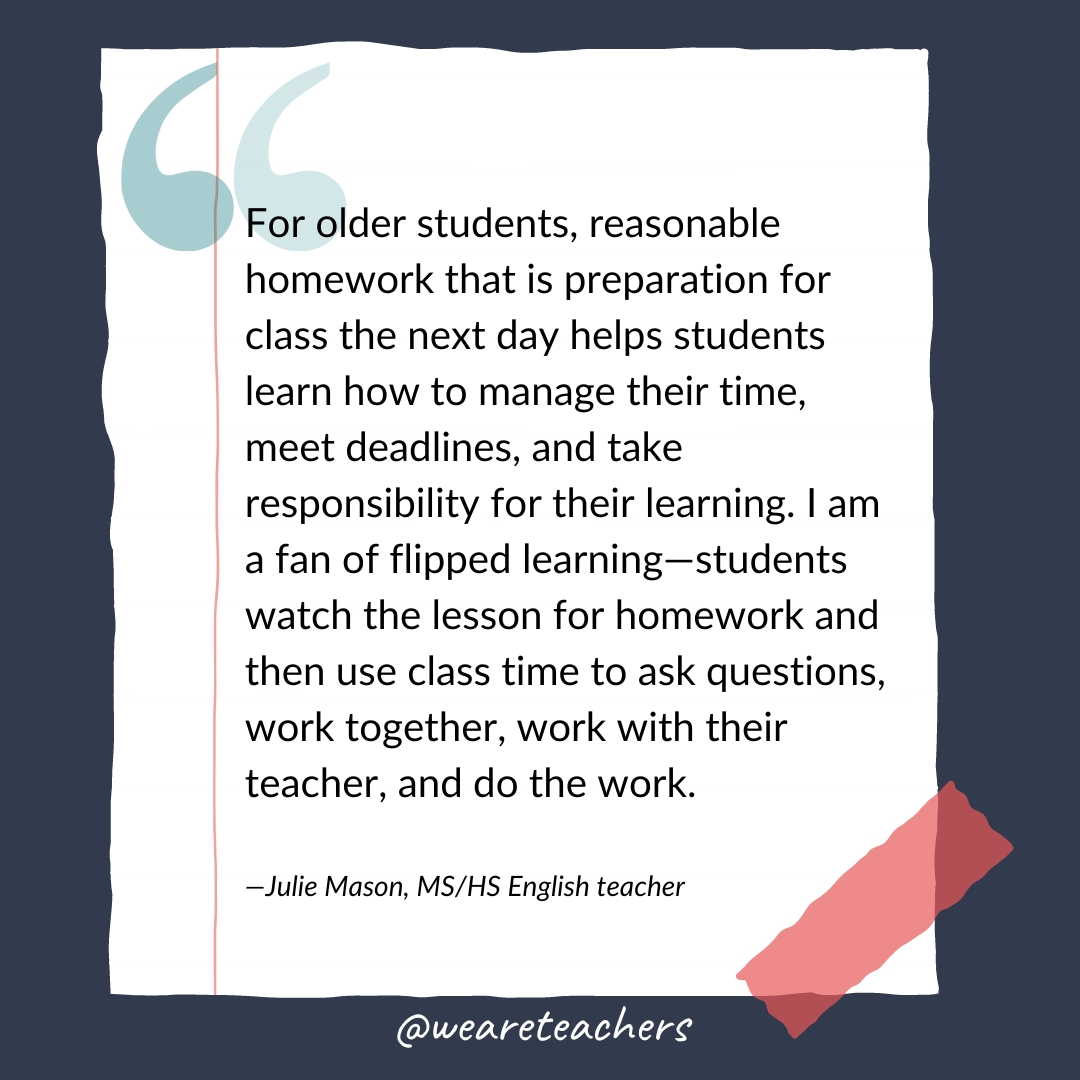
- “In middle school and high school, homework is important because it helps build stamina and potential study habits for college or trade schools.” —Desiree T., elementary teacher
- “Homework is good practice for subjects like math. In other subjects, it is good for reviewing subject matter.” —Ohio 8th grade social studies teacher
- “The proper amount of homework that is relevant to the daily lessons will help reinforce the skill and allow parents to see what their child is learning.” —Joanie B., Texas 4th/6th grade teacher
- “It’s not beneficial; parents today have not been taught how to help with new strategies. They are also often so busy that they cannot be bothered to help so they just give the answers. I saw a lot of this during the pandemic and even after when I would have 1st graders tell me they knew the answer ‘because they just know it.’ Not to mention the students who would actually benefit from having the extra practice of homework oftentimes do not have the support at home.” —Georgia 3rd grade teacher
- “In my 8 years of teaching, homework has never been successful for families or me. For the majority of parents and kids, it’s overwhelming. It is also additional work for teachers to manage. This is another extension and overreach of the expectations of the teacher.” —Lauren Anderson, Ohio 4th grade teacher
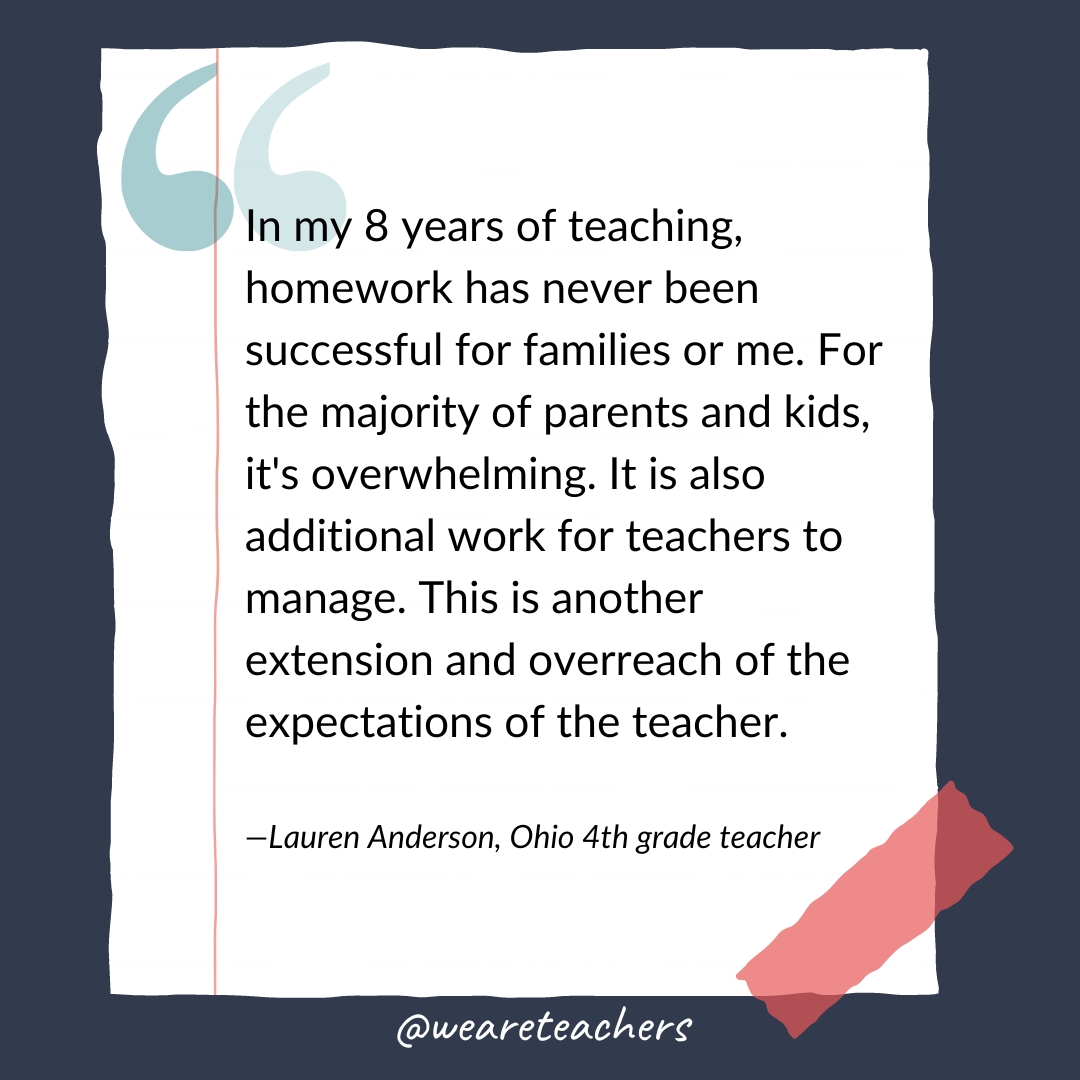
- “Homework isn’t busy work. How will today’s youth become tomorrow’s leaders (or survive college/trades classes) if they aren’t practicing skills to the next level?” —Arizona 1st grade teacher
Should we ban homework in elementary school?
Most adults today didn’t have homework in kindergarten, so they’re surprised when their child arrives home with a backpack full of worksheets. Older elementary students frequently bring home big projects like making a diorama or creating a family tree, something that usually means a lot of parent involvement. Is homework at this age reasonable and meaningful?
Supporters of a homework ban often cite research from John Hattie, who concluded that elementary school homework has no effect on academic progress. In a podcast he said, “Homework in primary school has an effect of around zero … It’s one of those lower hanging fruits that we should be looking in our primary schools to say, ‘Is it really making a difference?’”
The general wisdom these days seems to point to less homework overall at the elementary level, with one huge exception: reading. The research agrees: kids need to read at home as well as at school. Most educators recommend kids spend at least 20 minutes reading at home every single day.
More than half of our survey respondents (56%) are in favor of banning homework for the elementary grades. They worried about kids not having support or resources at home and taking away their time for creative play or family activities. But some teachers still find value in elementary homework, especially for math and reading, as long as it’s minimal. ADVERTISEMENT
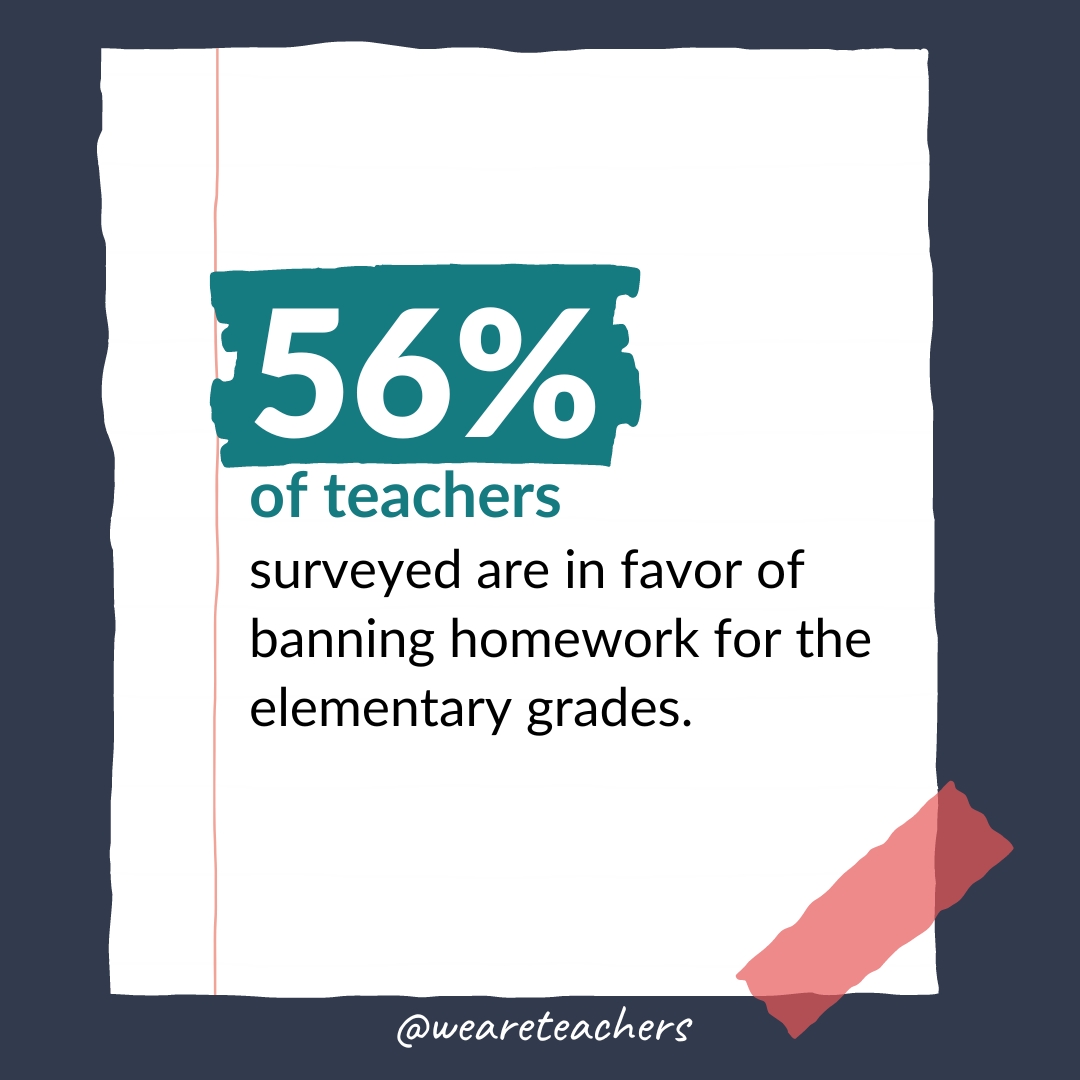
- “The common push for homework in elementary schools is ‘to prepare them for high school.’ That’s overreach. The elementary child’s job is to be an elementary child. We need to teach children where they are.” —Lauren Anderson
- “In elementary school, there should be a mixture of homework and unhomework activities. For example, a homework menu with a list of activities to complete for the month or for the week: Read in pajamas for 20 minutes, complete 3 math sheets, help cook dinner, have a family movie night, write your first and last name 10 times, help pack your snack, etc.” —Desiree T.
- “No homework should be part of the teacher motto—work smarter, not harder. Teachers spend too much time grading homework. I believe teachers and students should commit to making every minute count in the classroom so everyone can go home and just be with family.” —Jennifer N., 5th grade teacher
- “Students are learning new concepts. There is not a guarantee that someone will be able to help them with these tasks. Practicing incorrectly is worse than no practice at all.” —High school resource specialist
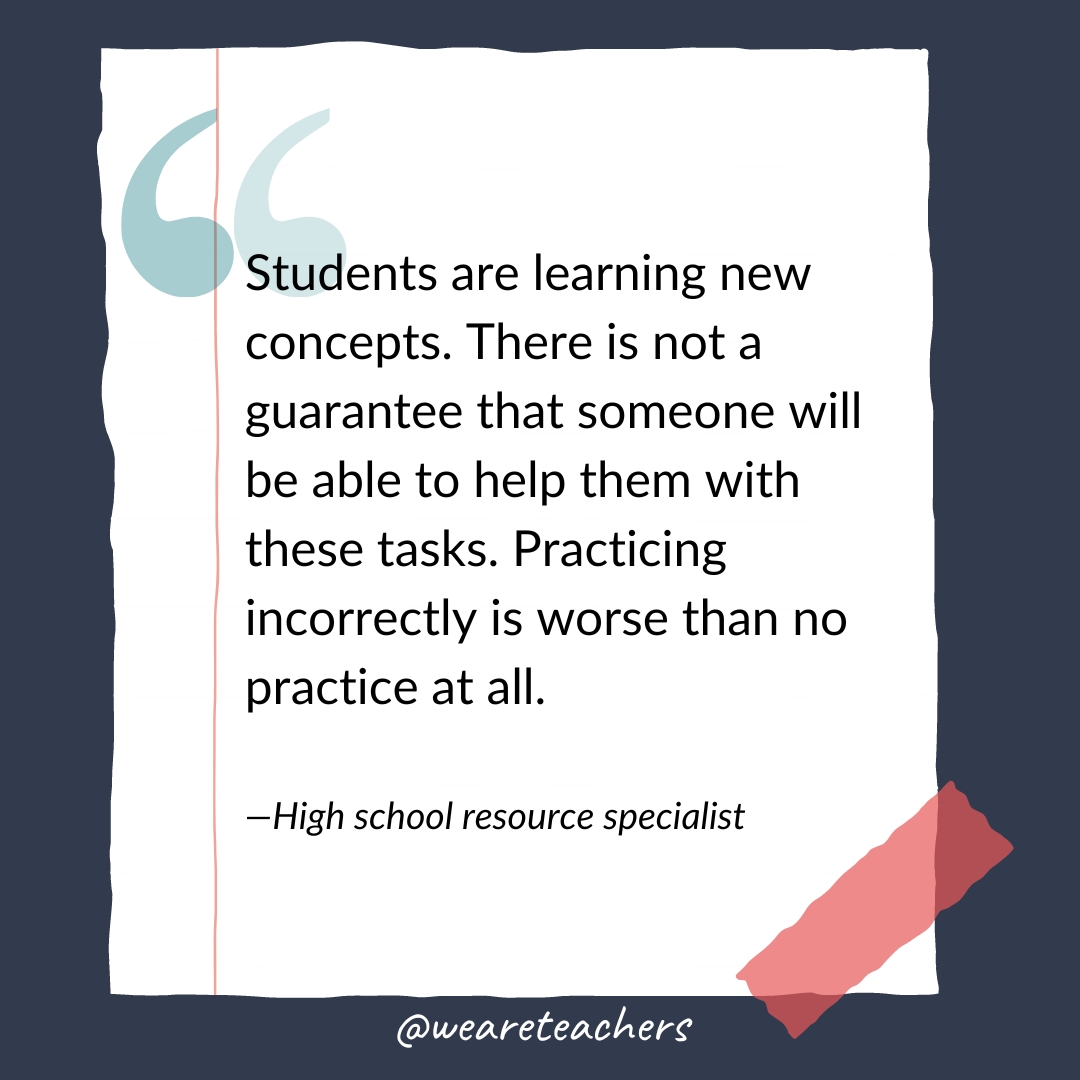
- “Kids should be encouraged to read [at home] and spend time with families and friends.” —Elementary English language development teacher
How much homework is enough (or too much)?
If we agree that that answer to “should we ban homework altogether” is “no,” then how much homework is reasonable? The answer seems to vary by grade level, as you would expect. But many point out the need to focus on the quality of homework over the quantity. And there have been increasing calls to let kids enjoy their longer school breaks without homework hanging over their heads .
A 2019 study showed that teenagers have doubled the amount of time they spend on homework since the 1990s. This study found that teens spend about an hour a day doing homework on average, which many would argue isn’t unreasonable. But in another study , kids self-reported doing an average of three hours of homework a night, which seems a lot more significant.
The National PTA and the NEA recommend kids do about 10 minutes of homework per night per grade level. In other words, a 3rd grader should do 30 minutes of homework. A 12th grader would do 120 minutes, or two full hours.
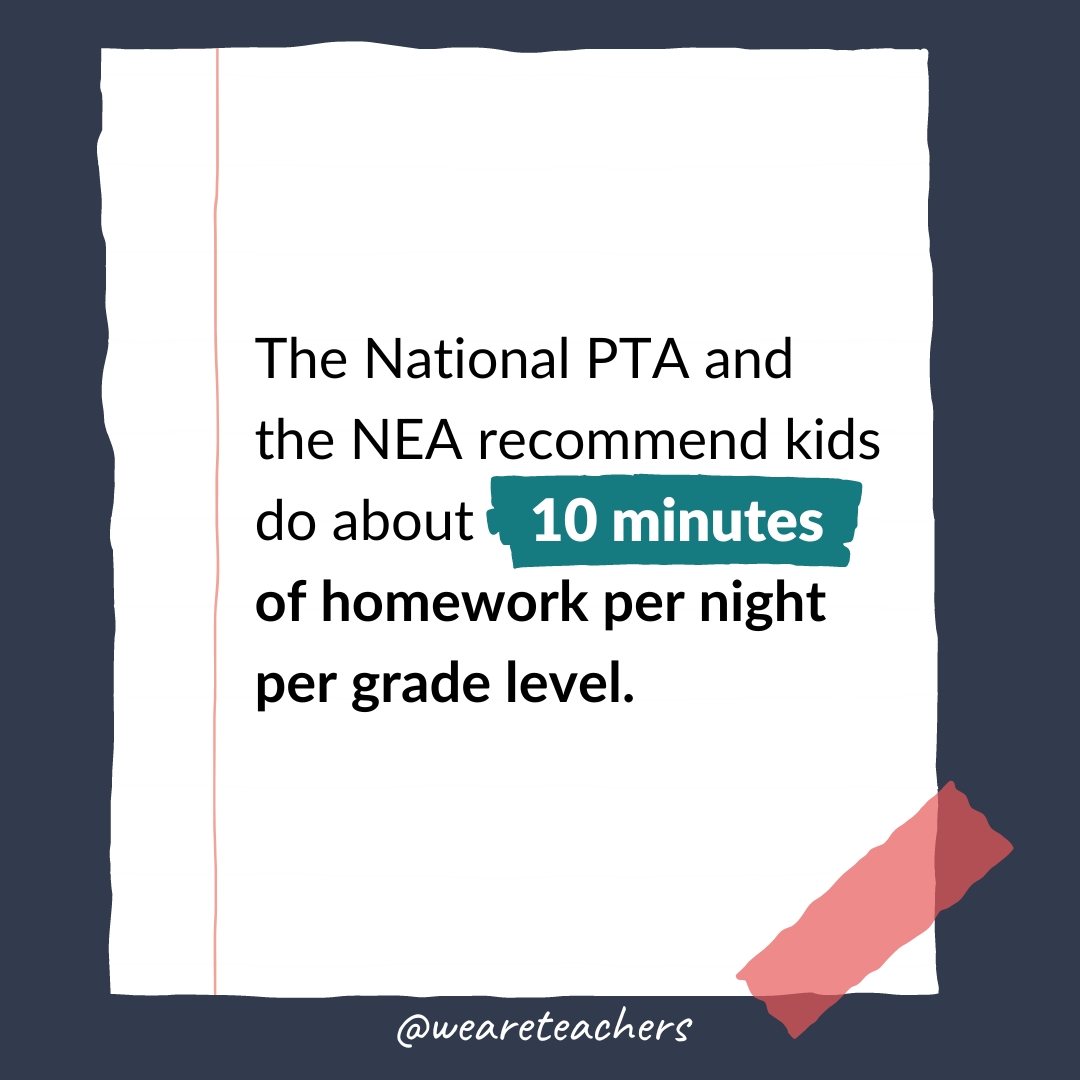
Perhaps more important than “How much homework?” is “What kind of homework?” Meaningful practice of what kids learned in class that day can be helpful. Busywork is not. And assigning really difficult work for kids to tackle at home, without any help from a teacher or other expert voice, is likely to simply frustrate them. Unfortunately, most teachers don’t receive training on how to assign homework that is meaningful and relevant to students. This is another area where we really need to consider a major culture shift.
While 75% of those surveyed say homework has some value in the upper grades at least, most feel it shouldn’t be excessive. Teachers stressed that it should never be used as punishment. Plus, it’s important to remember not all kids have the same access to help and resources outside the classroom.
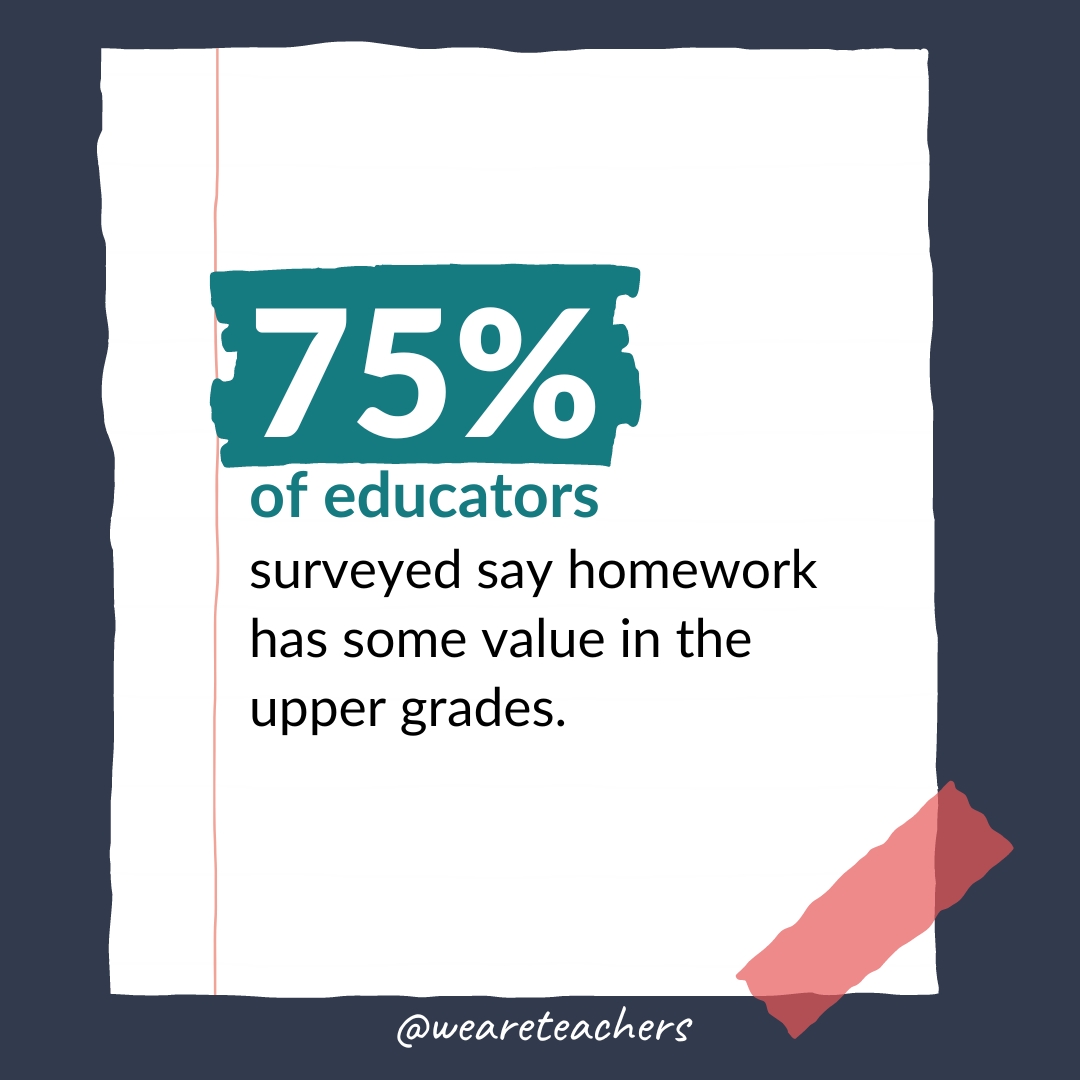
- “Homework is important but I also believe it shouldn’t exceed 30-60 minutes a night.” —Desiree T.
- “I do think elementary students should practice their reading and maybe 10 minutes of math [at home]. That may look different for each child due to how long it may take them to complete something.” —Wisconsin elementary special education teacher
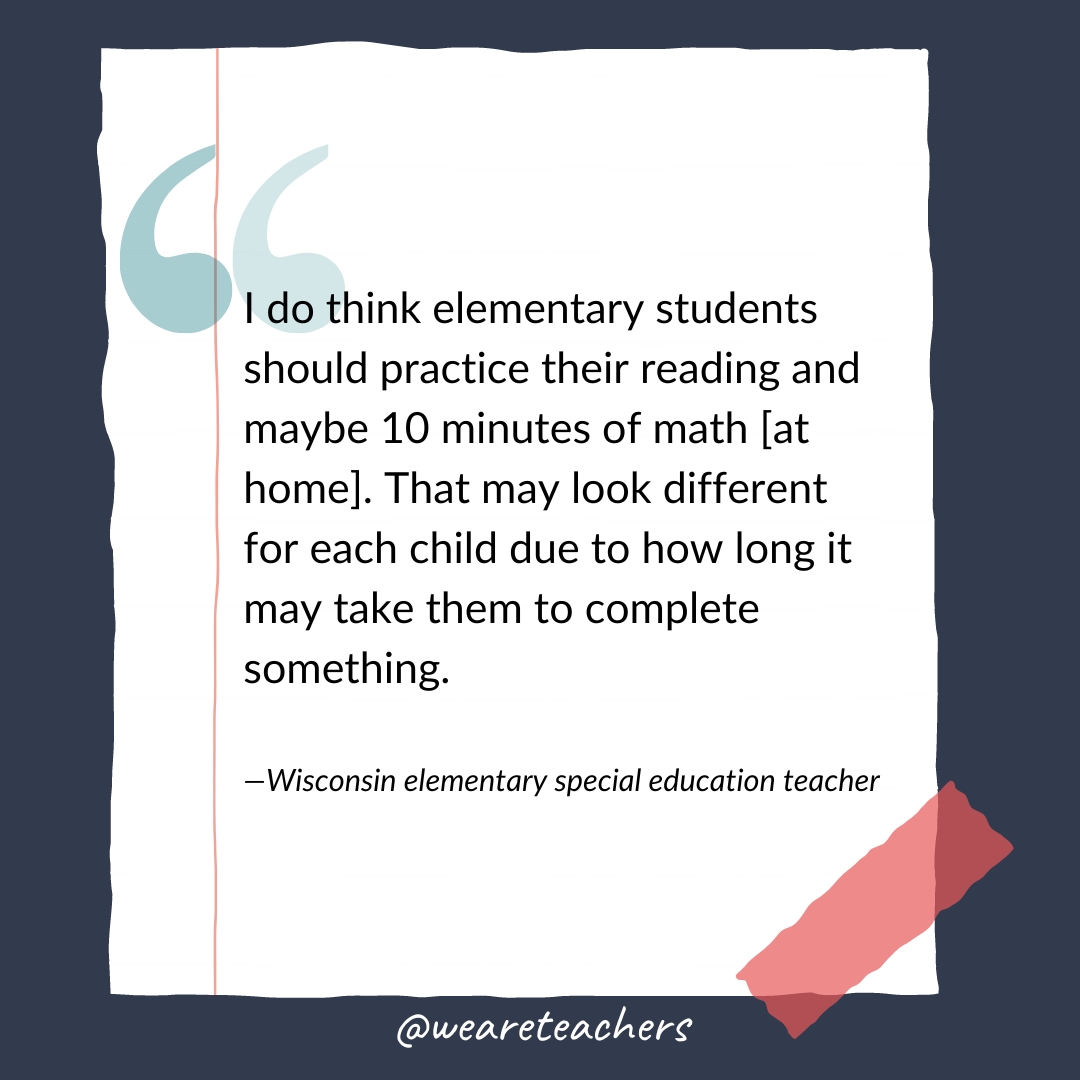
- “Elementary students are not too young to have homework once or twice a week. More than that would be too much.” —Tanya T., HS ELA teacher
- “In order to prepare students for high school, I feel 20-30 minutes of homework is okay [in elementary school].” —Florida 5th grade teacher
- “A ton of homework in every subject is ridiculous. But having to read parts of a book or an article and do several math problems should not be burdensome. And the benefit of those two things has been documented.” —Teresa Rennie, Pennsylvania 8th grade teacher

- “I encourage my elementary students to read a little every day to develop a love of reading.” —Meenal Parikh, Ohio 1st grade teacher
- “I think some homework is reasonable. Should it be a hindrance to other other activities or a major inconvenience? No. Some is good, but it doesn’t need to be an every-night thing.” —Patrick Danz, Michigan high school ELA teacher
Are there benefits to less (or no) homework?
Some schools have already banned homework, both in the United States and around the world. In April 2024, Poland enacted a homework ban for students in grades 1 through 3. In grades 4 through 8, homework must be optional and can’t count toward a student’s grade. Finnish schools are famous for assigning less homework at all ages , yet continuing to score highly in international rankings. So what are the benefits of freeing kids from homework?
Prioritizing mental health is at the forefront of the homework ban movement. Leaders say they want to give students time to develop other hobbies, relationships, and balance in their lives. When two Utah elementary schools officially banned homework , they found psychologist referrals for anxiety decreased by more than 50%.
In some cases, less or no homework can even have a positive effect on academic outcomes. One high school math teacher dramatically reduced the number of practice problems he asked his students to tackle at home. He also decreased the impact of homework on grades (from 25% to 1%). Now kids had more time to spend on just a few practice problems, and they weren’t stressed about getting them wrong. The result of changes like these? Higher standardized test scores on average.
Some schools have experimented with extending the school day in exchange for eliminating homework. This ensures that kids have more time to do independent work while also ensuring access to expert assistance. After all, not all parents have the time or ability to help with homework. And Internet access isn’t a given in every household. Keeping schoolwork at school means giving all kids equal access to the resources they need.
Teachers worry that kids who spend too much time doing homework are losing out in other areas. They want younger students to have more time to play. Older kids should be able to decompress after spending hours in the classroom. And everyone deserves more opportunities for family time and extracurriculars.
- “The stress and time surrounding homework is unnecessary. Jobs don’t require you take work home so school shouldn’t either. If a kid needs to work more, school could reach out with extra help, but homework is a waste of time. Home is for family time.” —Stephanie G., Maryland 1st grade teacher
- “Homework creates an equity problem. Not all learners have access to the same environment or supports at home as they do in school. The students who have supportive parents and resources (tutors, etc.) will succeed, while others will be penalized.” —Illinois high school teacher
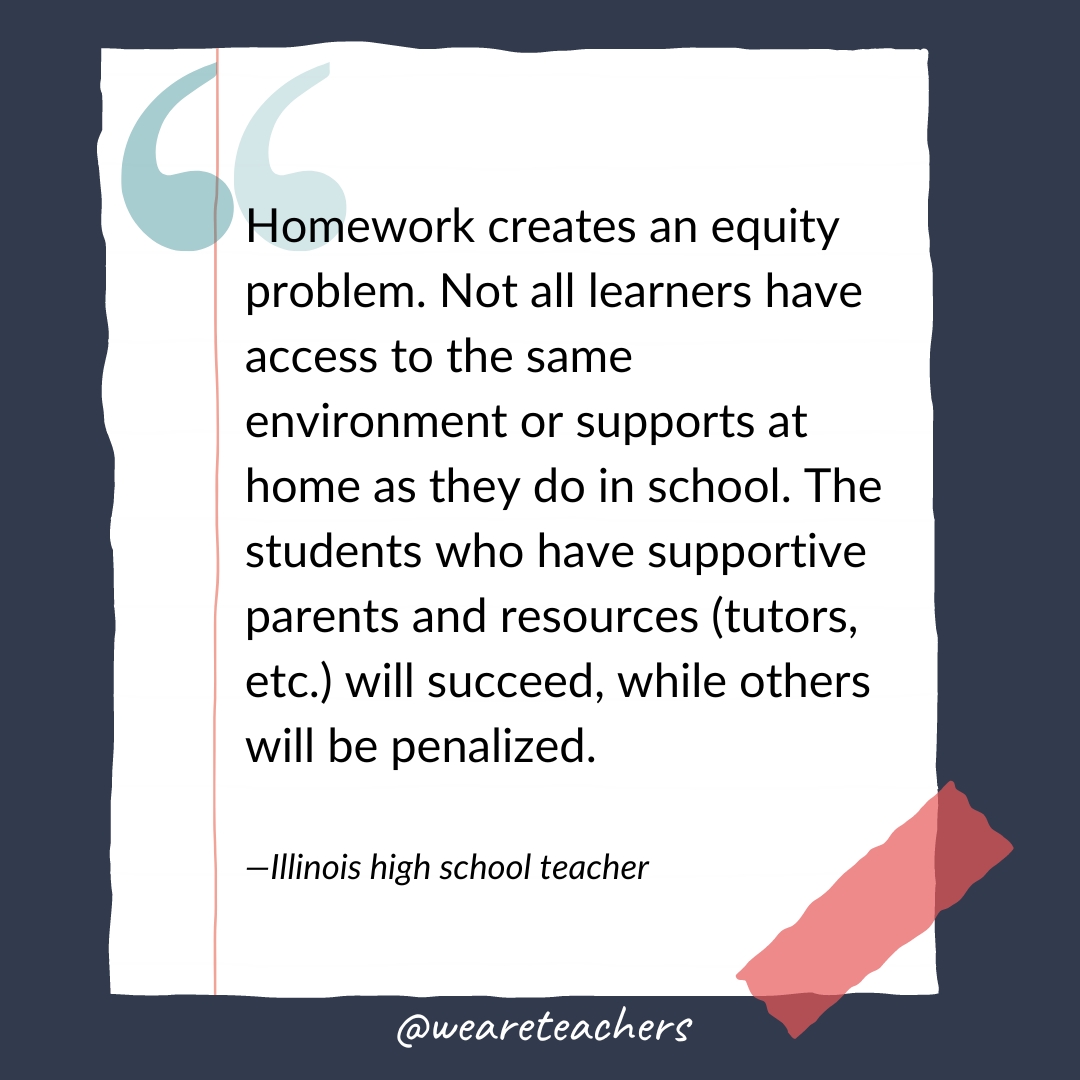
- “If they work at school, they don’t need to work at home. We’re teaching them that it’s okay for someone to tell them how to spend their off-time. School is their job. I don’t like working for free; why should they think that it’s okay?” —North Carolina 1st grade teacher
- “After-school programs, sports, and unstructured play is MUCH more meaningful and impactful for these generations of students.” —Lauren Anderson
- “There are other ways to teach children responsibility and time management than completing homework that will most likely be ungraded.” —4th grade social studies teacher
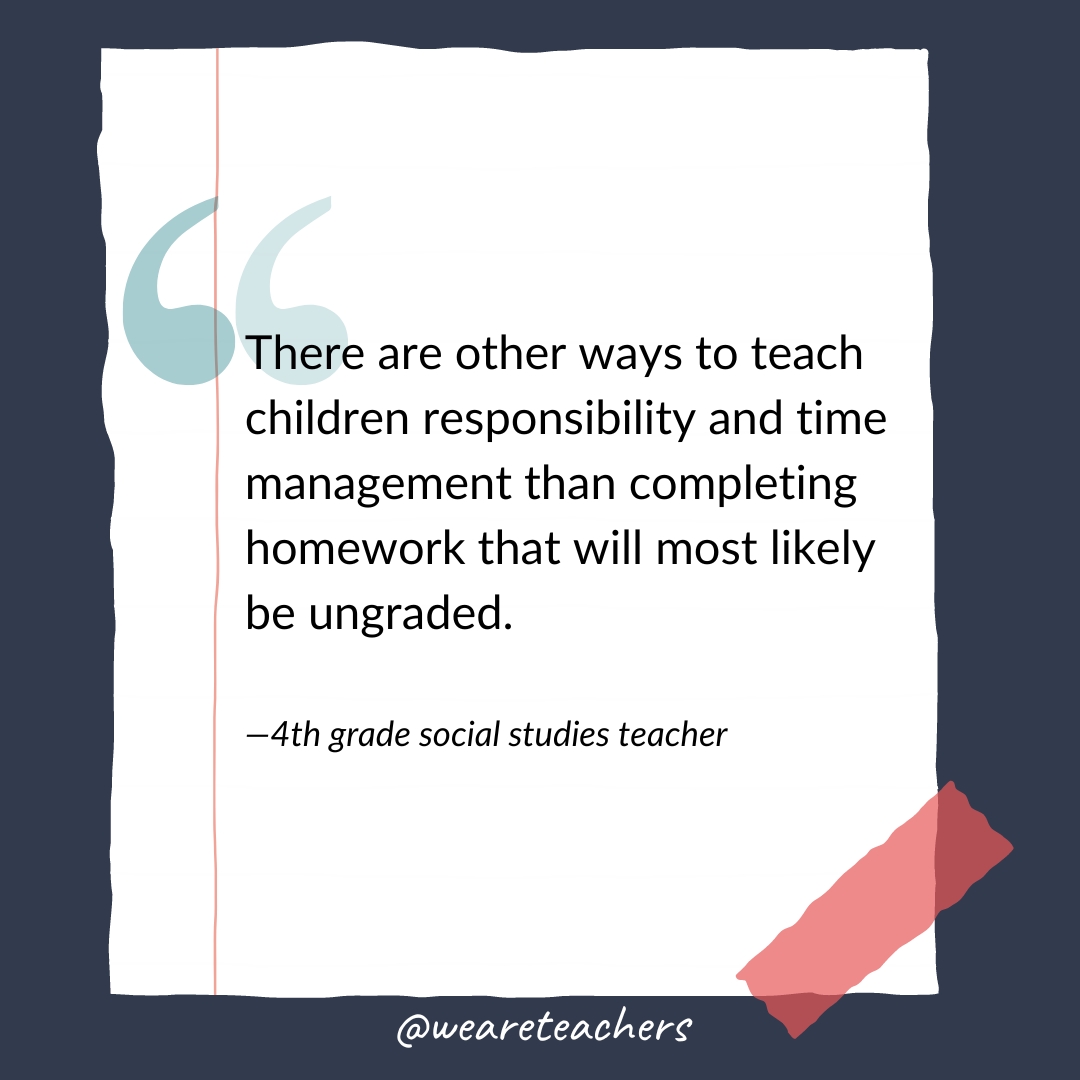

One Teacher’s Take on the Value of Homework: More Cons Than Pros
One 4th grade social studies teacher from North Carolina shared their thoughts with us in detail. We felt they were worth sharing with a wider audience. (Note: We’ve edited and condensed their words for space and clarity.)
Homework Hurts Families
“There are multiple factors that work together that make homework detrimental to students and their families. Children need to spend time with their parents building relationships of trust and respect. It is difficult because during the limited time families have together, they are forced by the schools to give that up to deal with homework.
“Many parents are unable to answer homework questions to help their children as methodology has changed and evolved. Homework becomes a stressful battlefield. Children with ADHD, autism, and other challenges have such a difficult time keeping focus at school. When they have to do additional work at home, there are increased meltdowns and battles, putting further strains on families.”
Homework’s Time Cost
“Children also have less time to complete work at home due to how overscheduled families have become. Children as young as 3rd grade arrive home from their games as late as 10:00 at night. That is often their first opportunity to sit down to complete their work. When they come to school the next day, they become irritable, unfocused, frustrated, and unable to quickly grasp new material.
“In older grades, teachers don’t plan together and don’t understand how much is required of the student to complete each night. If a high school student has six classes and each teacher assigns only 30 minutes of homework each night, that adds up to three hours. I hear of many teachers that each give an hour each night. I don’t see how it is possible for a high school student to complete six hours of homework every night.
“The additional stress of homework for the teacher, students, and families is not worth it. Give families time to spend together, and free up teacher time by not having to hunt down missing work and reviewing what they are not grading. Allow children to have a better bedtime and avoid meltdowns at home, which lead to additional stress, anxiety, and depression.”
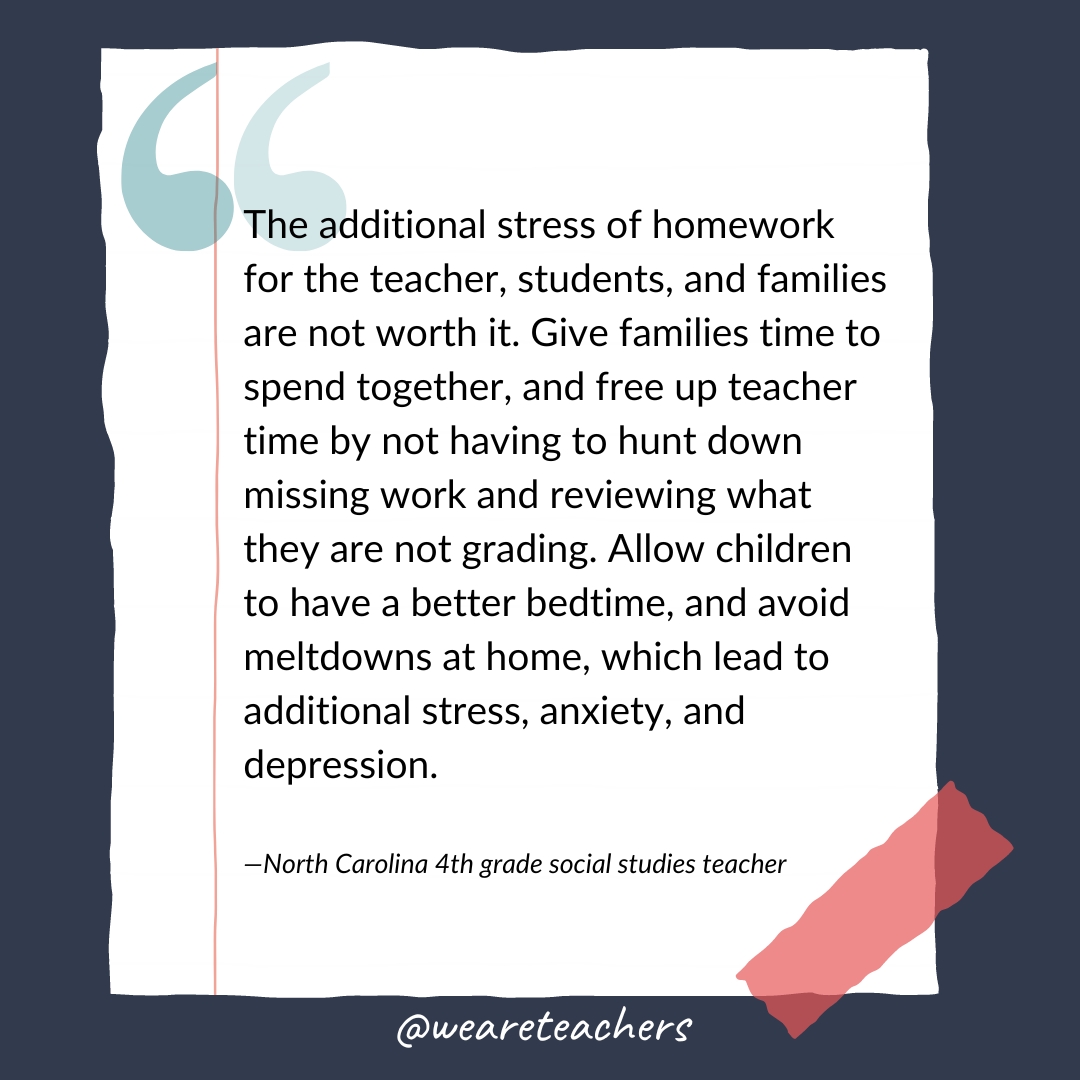
We’d love to hear your thoughts—should homework be banned? Join the discussion in the We Are Teachers HELPLINE group on Facebook.

You Might Also Like

What’s It Like Teaching in a Rural School?
One-third of America's schools are in rural areas. Continue Reading
Copyright © 2024. All rights reserved. 5335 Gate Parkway, Jacksonville, FL 32256
- Subscribe to BBC Science Focus Magazine
- Previous Issues
- Future tech
- Everyday science
- Planet Earth
- Newsletters
Should homework be banned?
Social media has sparked into life about whether children should be given homework - should students be freed from this daily chore? Dr Gerald Letendre, a professor of education at Pennsylvania State University, investigates.
We’ve all done it: pretended to leave an essay at home, or stayed up until 2am to finish a piece of coursework we’ve been ignoring for weeks. Homework, for some people, is seen as a chore that’s ‘wrecking kids’ or ‘killing parents’, while others think it is an essential part of a well-rounded education. The problem is far from new: public debates about homework have been raging since at least the early-1900s, and recently spilled over into a Twitter feud between Gary Lineker and Piers Morgan.
Ironically, the conversation surrounding homework often ignores the scientific ‘homework’ that researchers have carried out. Many detailed studies have been conducted, and can guide parents, teachers and administrators to make sensible decisions about how much work should be completed by students outside of the classroom.
So why does homework stir up such strong emotions? One reason is that, by its very nature, it is an intrusion of schoolwork into family life. I carried out a study in 2005, and found that the amount of time that children and adolescents spend in school, from nursery right up to the end of compulsory education, has greatly increased over the last century . This means that more of a child’s time is taken up with education, so family time is reduced. This increases pressure on the boundary between the family and the school.
Plus, the amount of homework that students receive appears to be increasing, especially in the early years when parents are keen for their children to play with friends and spend time with the family.
Finally, success in school has become increasingly important to success in life. Parents can use homework to promote, or exercise control over, their child’s academic trajectory, and hopefully ensure their future educational success. But this often leaves parents conflicted – they want their children to be successful in school, but they don’t want them to be stressed or upset because of an unmanageable workload.

However, the issue isn’t simply down to the opinions of parents, children and their teachers – governments also like to get involved. In the autumn of 2012, French president François Hollande hit world headlines after making a comment about banning homework, ostensibly because it promoted inequality. The Chinese government has also toyed with a ban, because of concerns about excessive academic pressure being put on children.
The problem is, some politicians and national administrators regard regulatory policy in education as a solution for a wide array of social, economic and political issues, perhaps without considering the consequences for students and parents.
Does homework work?
Homework seems to generally have a positive effect for high school students, according to an extensive range of empirical literature. For example, Duke University’s Prof Harris Cooper carried out a meta-analysis using data from US schools, covering a period from 1987 to 2003. He found that homework offered a general beneficial impact on test scores and improvements in attitude, with a greater effect seen in older students. But dig deeper into the issue and a complex set of factors quickly emerges, related to how much homework students do, and exactly how they feel about it.
In 2009, Prof Ulrich Trautwein and his team at the University of Tübingen found that in order to establish whether homework is having any effect, researchers must take into account the differences both between and within classes . For example, a teacher may assign a good deal of homework to a lower-level class, producing an association between more homework and lower levels of achievement. Yet, within the same class, individual students may vary significantly in how much homework improves their baseline performance. Plus, there is the fact that some students are simply more efficient at completing their homework than others, and it becomes quite difficult to pinpoint just what type of homework, and how much of it, will affect overall academic performance.
Over the last century, the amount of time that children and adolescents spend in school has greatly increased
Gender is also a major factor. For example, a study of US high school students carried out by Prof Gary Natriello in the 1980s revealed that girls devote more time to homework than boys, while a follow-up study found that US girls tend to spend more time on mathematics homework than boys. Another study, this time of African-American students in the US, found that eighth grade (ages 13-14) girls were more likely to successfully manage both their tasks and emotions around schoolwork, and were more likely to finish homework.
So why do girls seem to respond more positively to homework? One possible answer proposed by Eunsook Hong of the University of Nevada in 2011 is that teachers tend to rate girls’ habits and attitudes towards work more favourably than boys’. This perception could potentially set up a positive feedback loop between teacher expectations and the children’s capacity for academic work based on gender, resulting in girls outperforming boys. All of this makes it particularly difficult to determine the extent to which homework is helping, though it is clear that simply increasing the time spent on assignments does not directly correspond to a universal increase in learning.
Can homework cause damage?
The lack of empirical data supporting homework in the early years of education, along with an emerging trend to assign more work to this age range, appears to be fuelling parental concerns about potential negative effects. But, aside from anecdotes of increased tension in the household, is there any evidence of this? Can doing too much homework actually damage children?
Evidence suggests extreme amounts of homework can indeed have serious effects on students’ health and well-being. A Chinese study carried out in 2010 found a link between excessive homework and sleep disruption: children who had less homework had better routines and more stable sleep schedules. A Canadian study carried out in 2015 by Isabelle Michaud found that high levels of homework were associated with a greater risk of obesity among boys, if they were already feeling stressed about school in general.
For useful revision guides and video clips to assist with learning, visit BBC Bitesize . This is a free online study resource for UK students from early years up to GCSEs and Scottish Highers.
It is also worth noting that too much homework can create negative effects that may undermine any positives. These negative consequences may not only affect the child, but also could also pile on the stress for the whole family, according to a recent study by Robert Pressman of the New England Centre for Pediatric Psychology. Parents were particularly affected when their perception of their own capacity to assist their children decreased.
What then, is the tipping point, and when does homework simply become too much for parents and children? Guidelines typically suggest that children in the first grade (six years old) should have no more that 10 minutes per night, and that this amount should increase by 10 minutes per school year. However, cultural norms may greatly affect what constitutes too much.
A study of children aged between 8 and 10 in Quebec defined high levels of homework as more than 30 minutes a night, but a study in China of children aged 5 to 11 deemed that two or more hours per night was excessive. It is therefore difficult to create a clear standard for what constitutes as too much homework, because cultural differences, school-related stress, and negative emotions within the family all appear to interact with how homework affects children.
Should we stop setting homework?
In my opinion, even though there are potential risks of negative effects, homework should not be banned. Small amounts, assigned with specific learning goals in mind and with proper parental support, can help to improve students’ performance. While some studies have generally found little evidence that homework has a positive effect on young children overall, a 2008 study by Norwegian researcher Marte Rønning found that even some very young children do receive some benefit. So simply banning homework would mean that any particularly gifted or motivated pupils would not be able to benefit from increased study. However, at the earliest ages, very little homework should be assigned. The decisions about how much and what type are best left to teachers and parents.
As a parent, it is important to clarify what goals your child’s teacher has for homework assignments. Teachers can assign work for different reasons – as an academic drill to foster better study habits, and unfortunately, as a punishment. The goals for each assignment should be made clear, and should encourage positive engagement with academic routines.

Parents should inform the teachers of how long the homework is taking, as teachers often incorrectly estimate the amount of time needed to complete an assignment, and how it is affecting household routines. For young children, positive teacher support and feedback is critical in establishing a student’s positive perception of homework and other academic routines. Teachers and parents need to be vigilant and ensure that homework routines do not start to generate patterns of negative interaction that erode students’ motivation.
Likewise, any positive effects of homework are dependent on several complex interactive factors, including the child’s personal motivation, the type of assignment, parental support and teacher goals. Creating an overarching policy to address every single situation is not realistic, and so homework policies tend to be fixated on the time the homework takes to complete. But rather than focusing on this, everyone would be better off if schools worked on fostering stronger communication between parents, teachers and students, allowing them to respond more sensitively to the child’s emotional and academic needs.
- Five brilliant science books for kids
- Will e-learning replace teachers?
Follow Science Focus on Twitter , Facebook , Instagram and Flipboard
Share this article
© Getty Images

- Terms & Conditions
- Privacy policy
- Cookies policy
- Code of conduct
- Magazine subscriptions
- Manage preferences

IMAGES
COMMENTS
Although banning homework might seem like an unorthodox process, there are legitimate advantages to consider with this effort. There are some disadvantages which some families may encounter as well. These are the updated lists of the pros and cons of banning homework to review.
Proponents say homework improves student achievement. Opponents say too much homework is harmful to students. Explore both sides of the debate.
Is homework, including the projects and writing assignments you do at home, an important part of your learning experience? Or, in your opinion, is it not a good use of time? Explain.
Cons of Homework Bans. 1. Homework Fosters Study Skills and Independent Learning. Proponents of keeping homework in schools say that the practice is about more than just reviewing...
It's no secret that kids hate homework. And as students grapple with an ongoing pandemic that has had a wide range of mental health impacts, is it time schools start listening to their pleas...
Every kid dreams of it, but should homework be banned? We asked real educators if the time has come to rethink our stance on this hot topic. The cons of homework are starting to outweigh the pros.
After decades of debate, researchers are still sorting out the truth about homework’s pros and cons. One point they can agree on: Quality assignments matter.
Homework is a polarising topic among students, teachers and parents. The research shows that the impact varies based on lots of different factors. Read more about the pros and cons and join the debate.
In the autumn of 2012, French president François Hollande hit world headlines after making a comment about banning homework, ostensibly because it promoted inequality. The Chinese government has also toyed with a ban, because of concerns about excessive academic pressure being put on children.
Banning homework can alleviate stress and mental health concerns, as it allows for more time for relaxation, self-care, and structured sleep schedules. Banning homework can help students have more quality time with family and fulfill personal obligations, reducing stress and burnout risks.